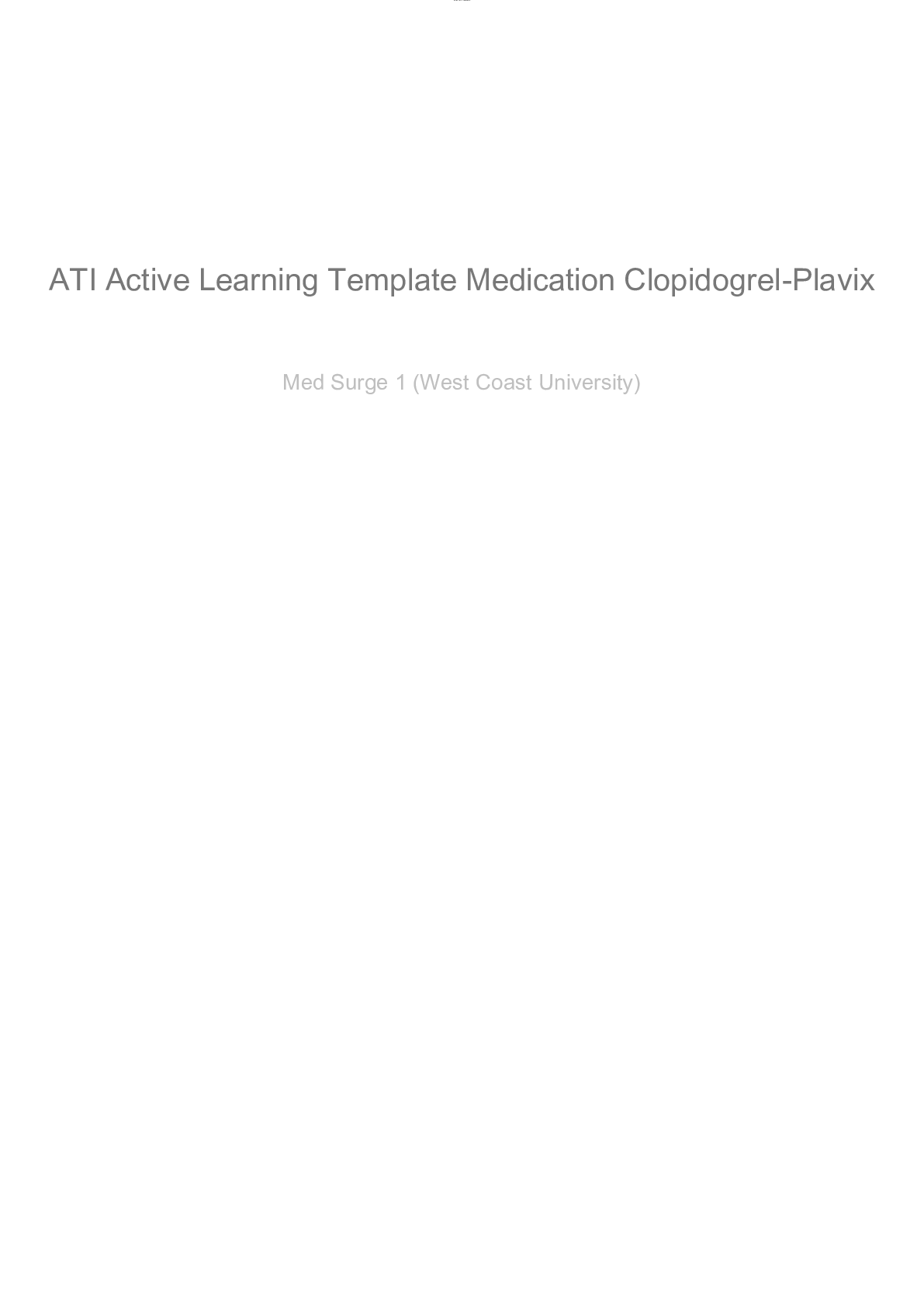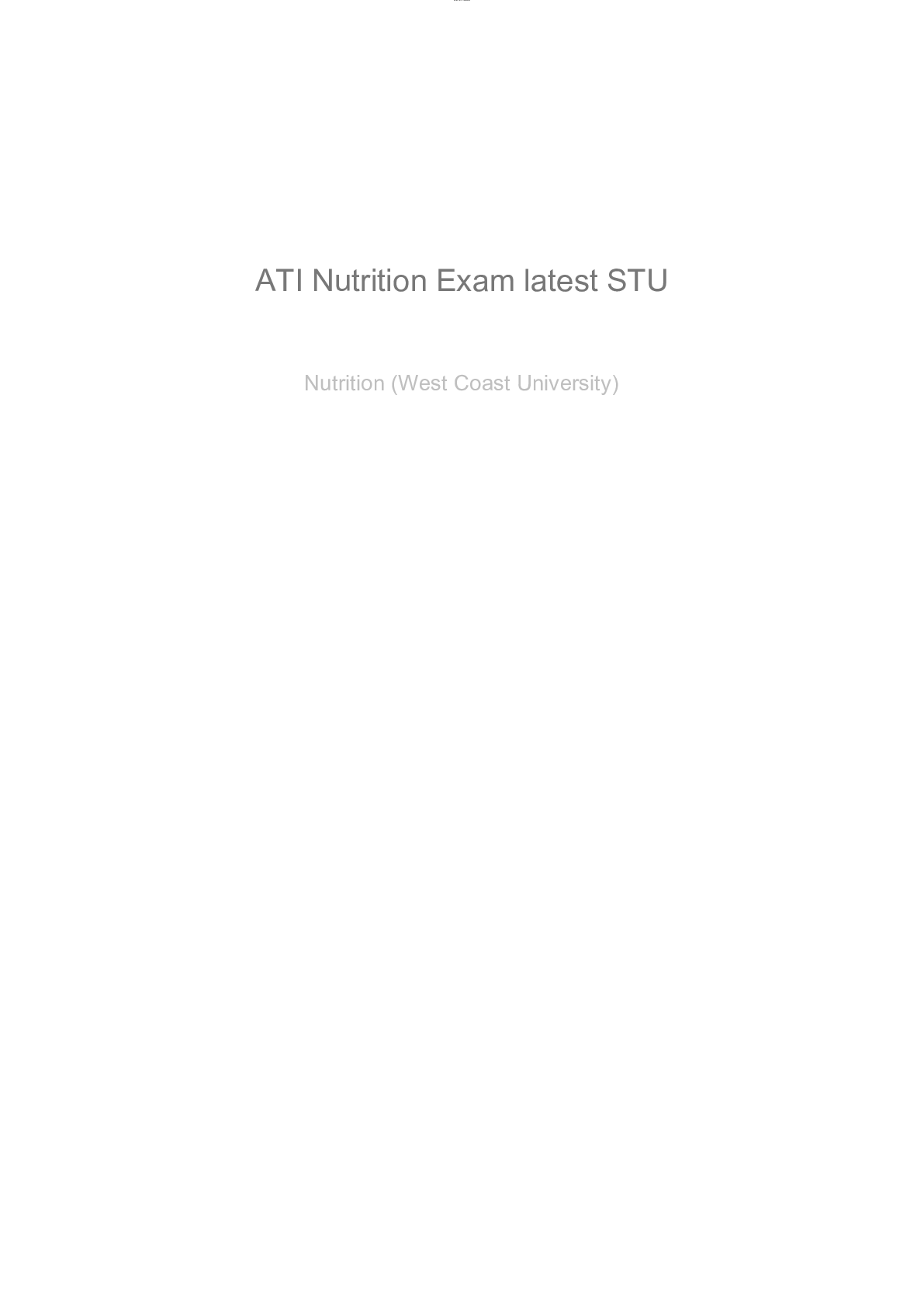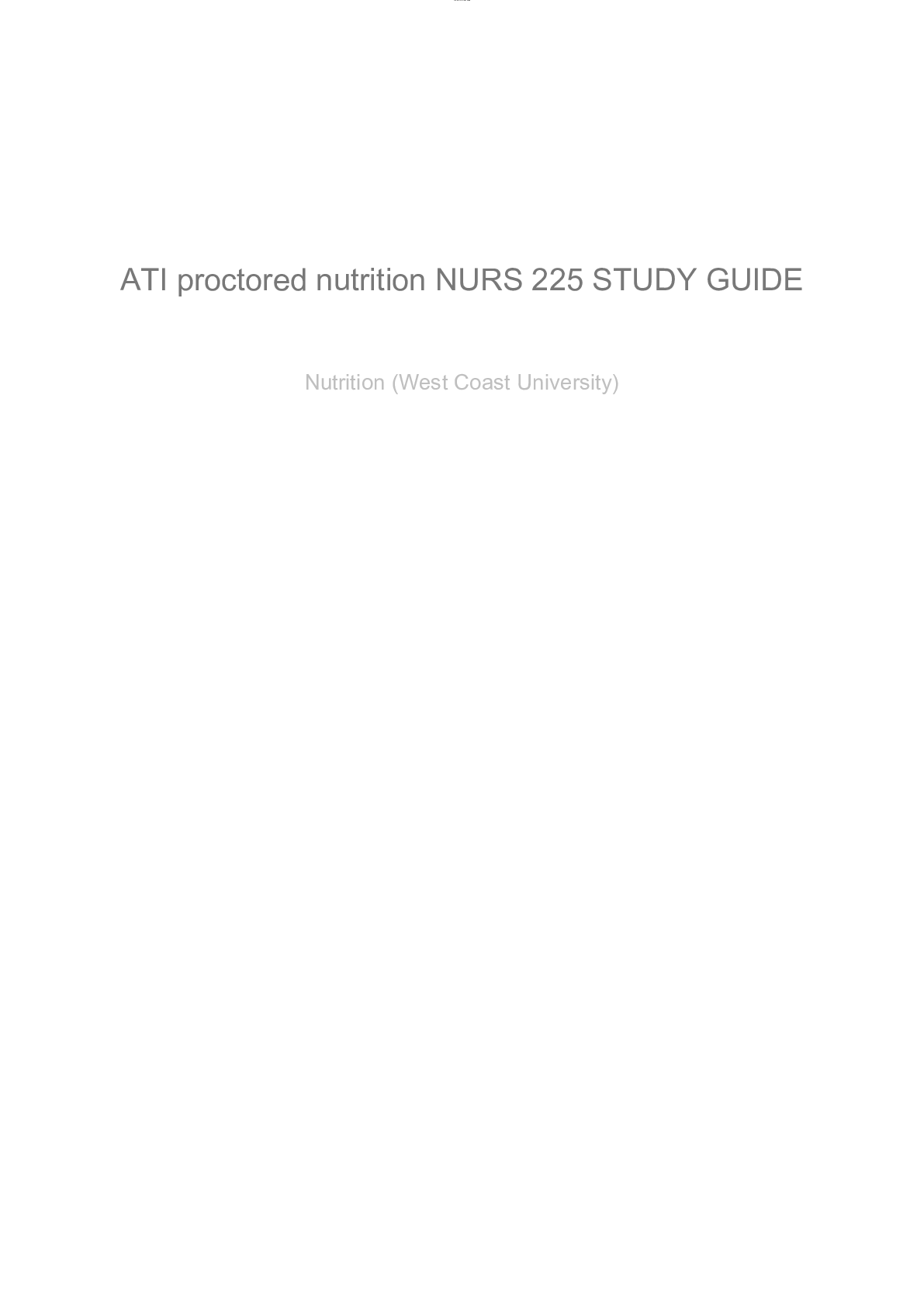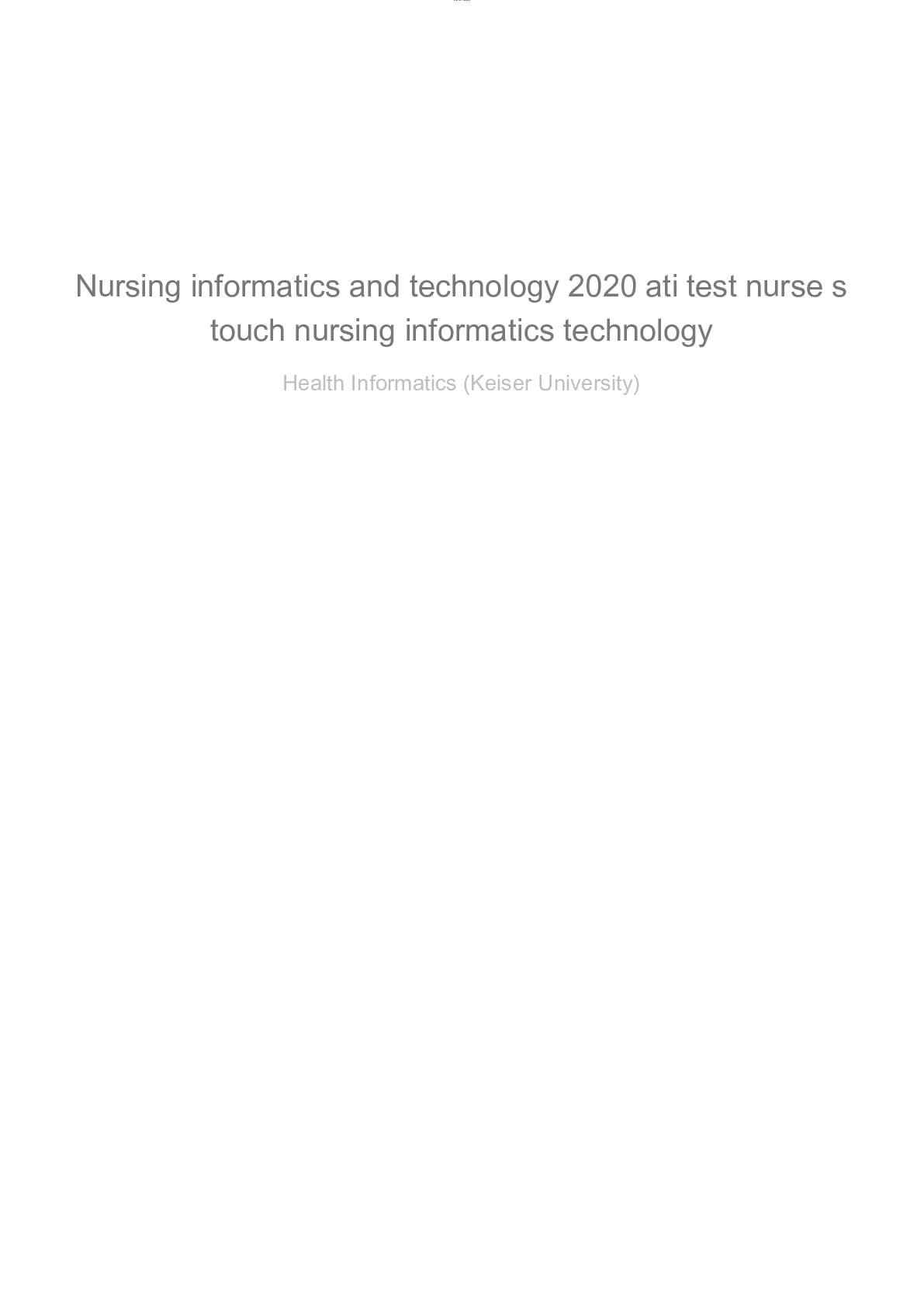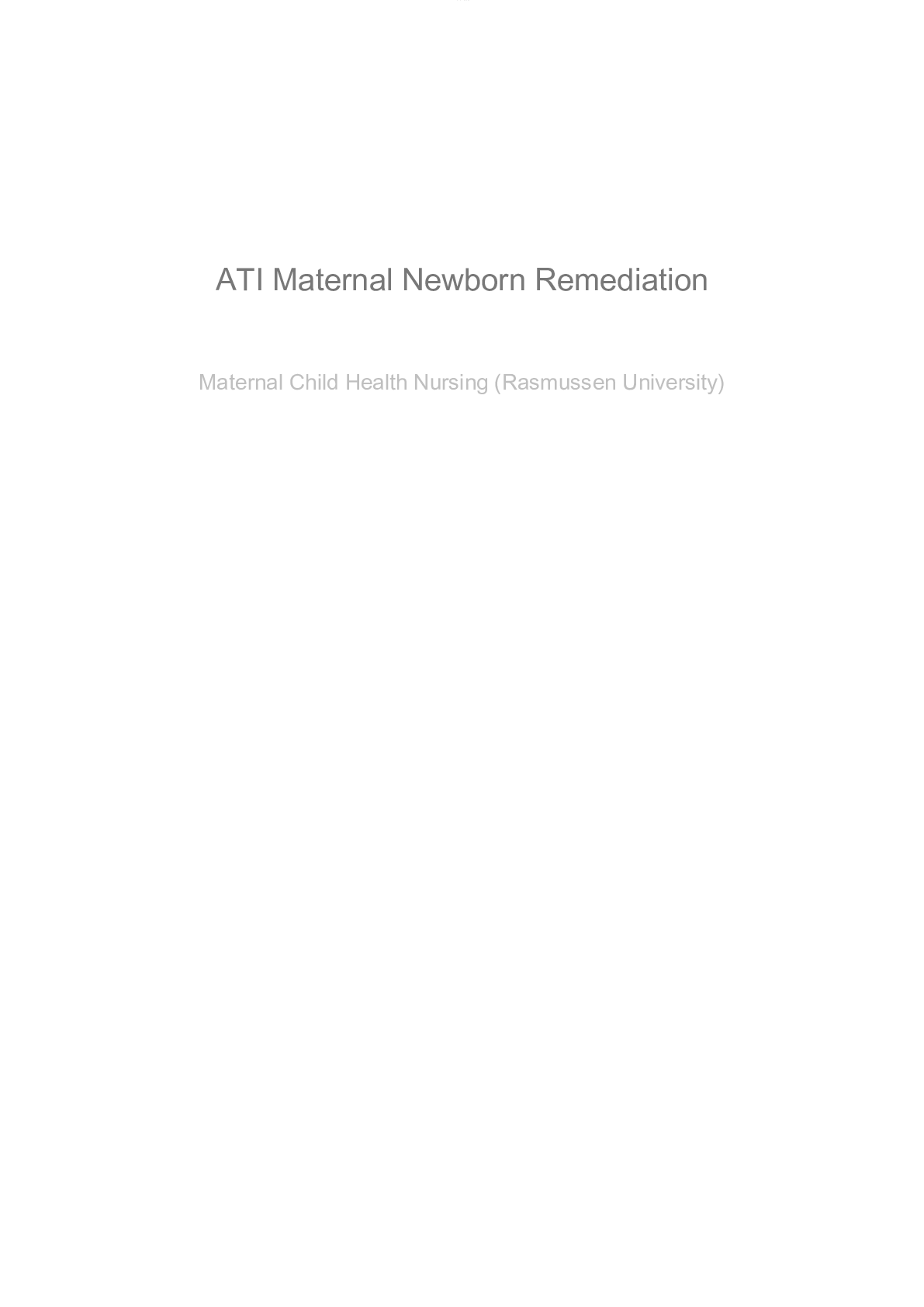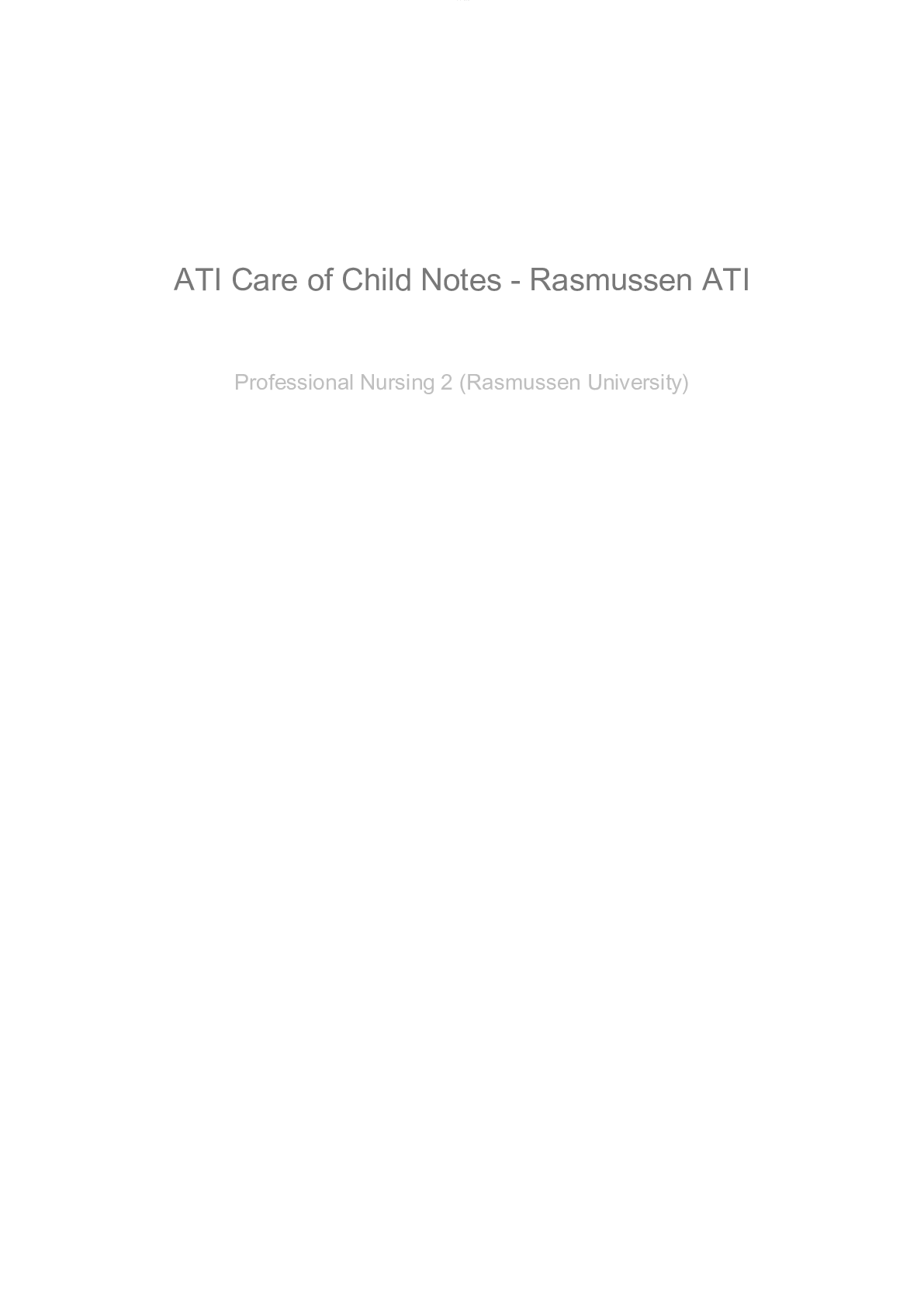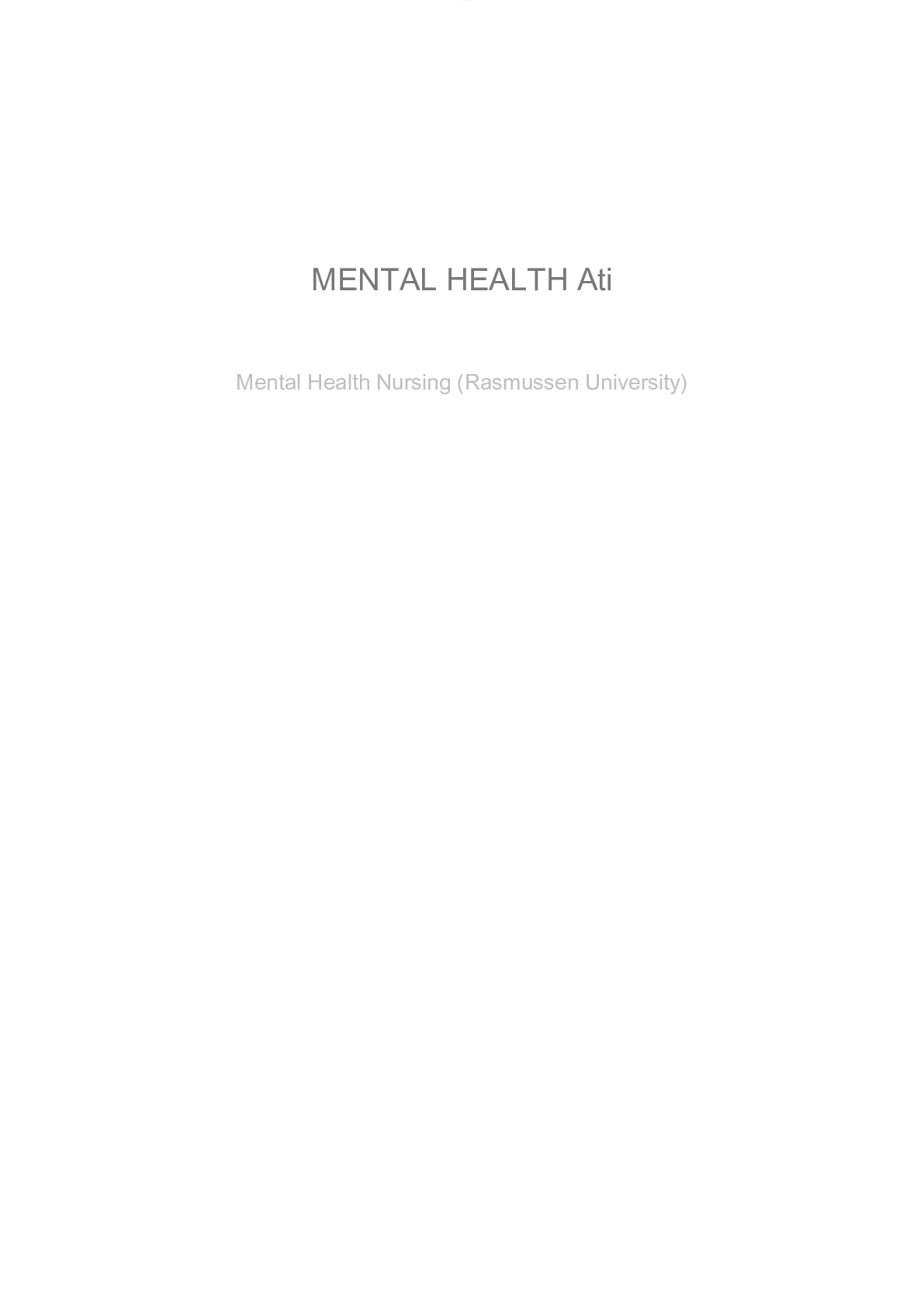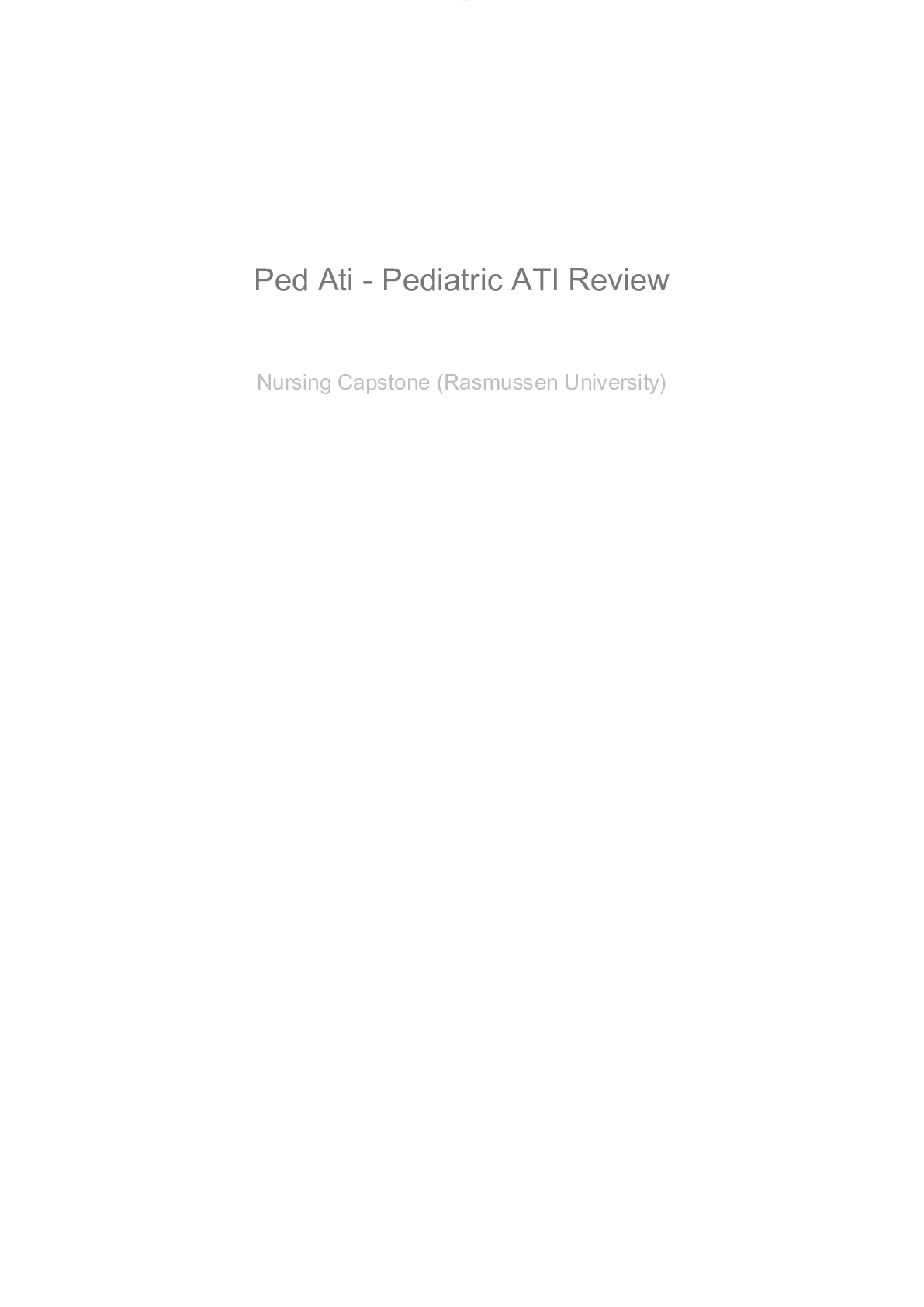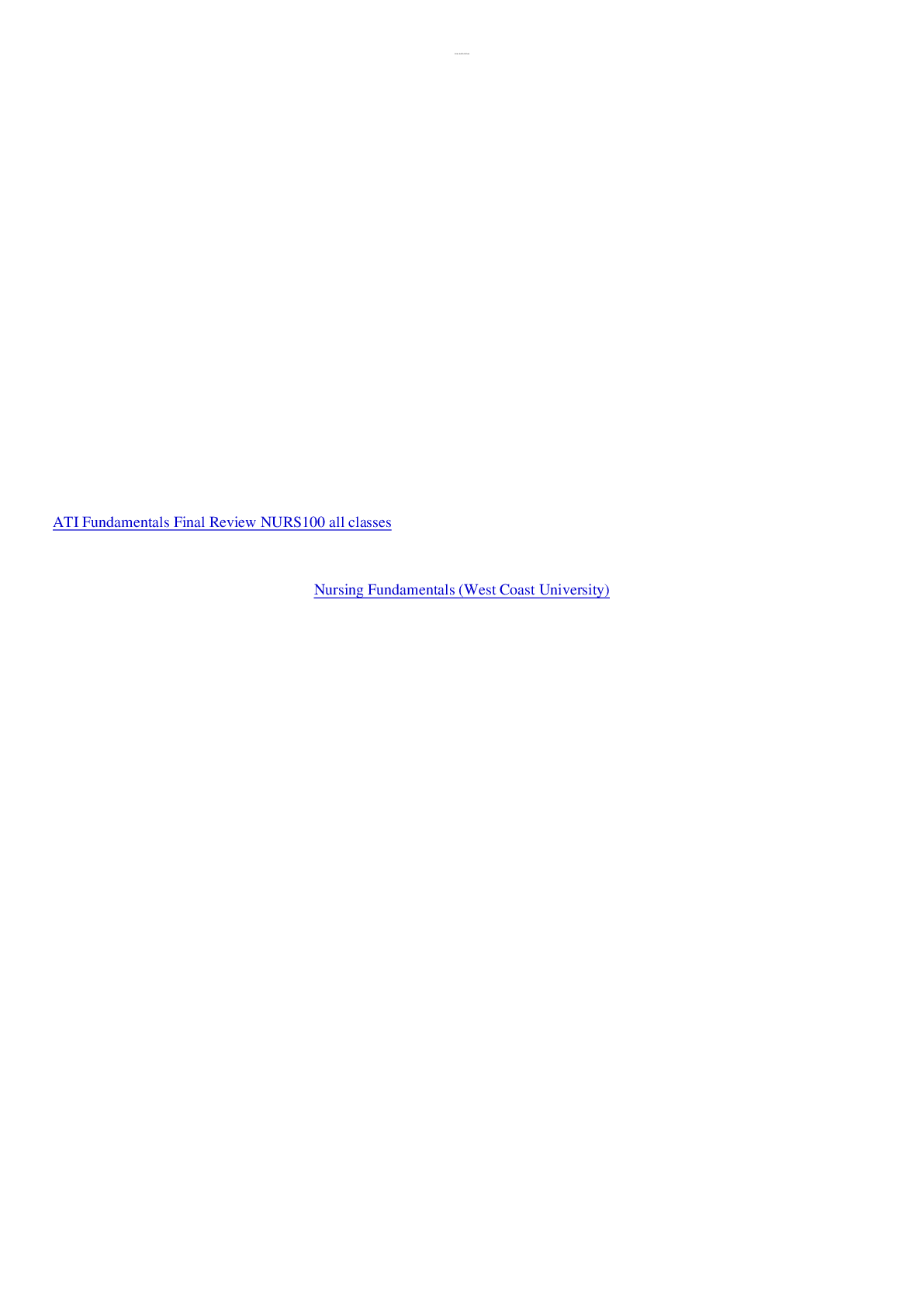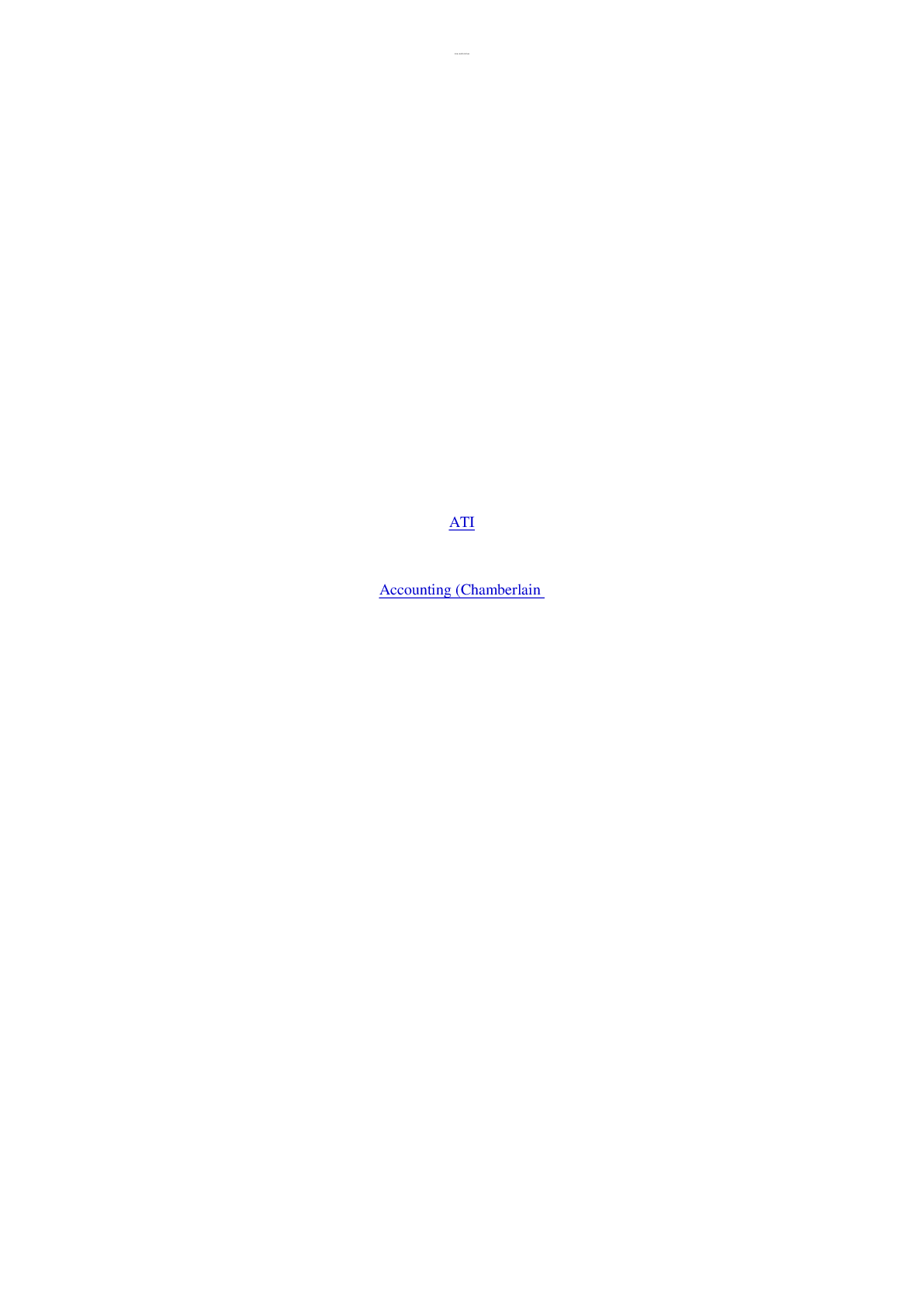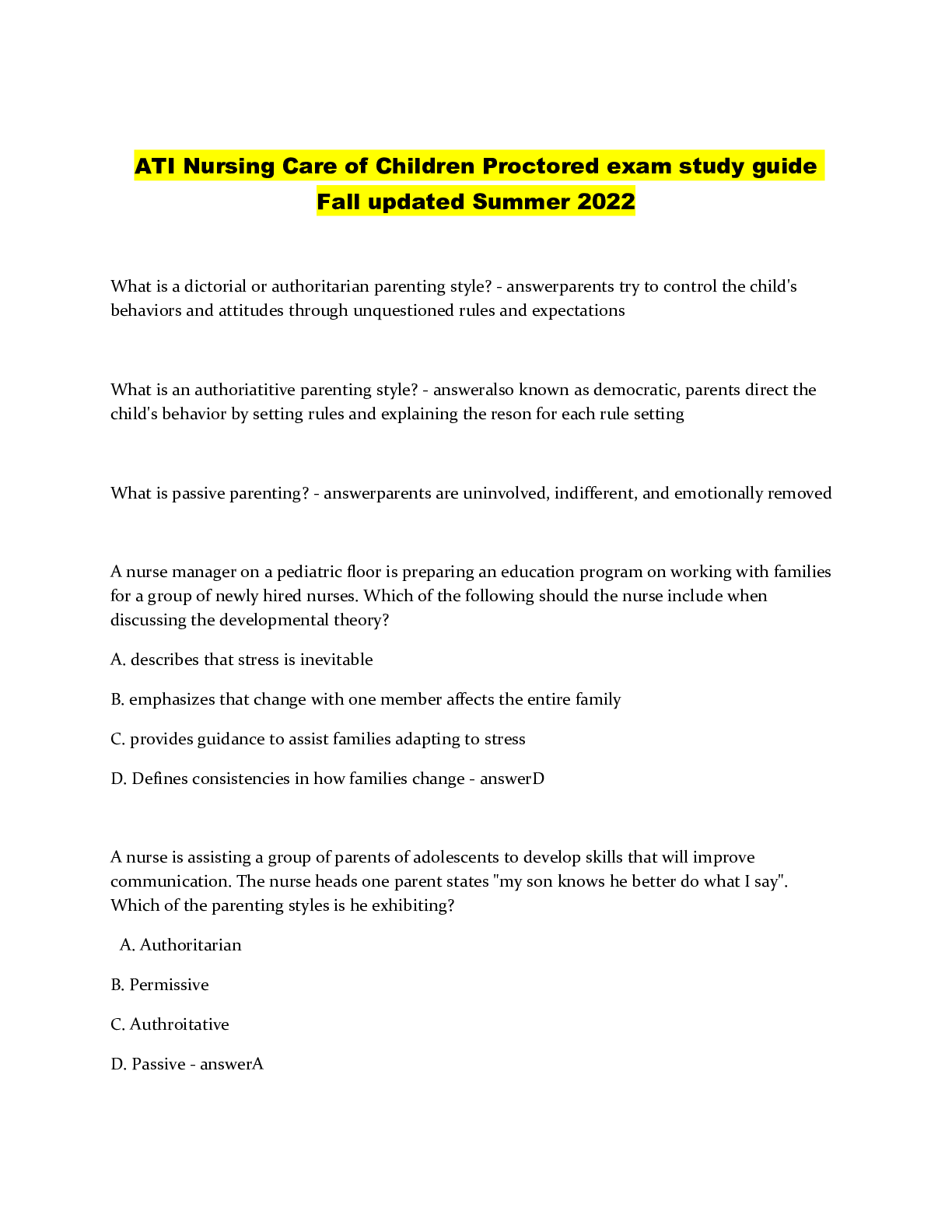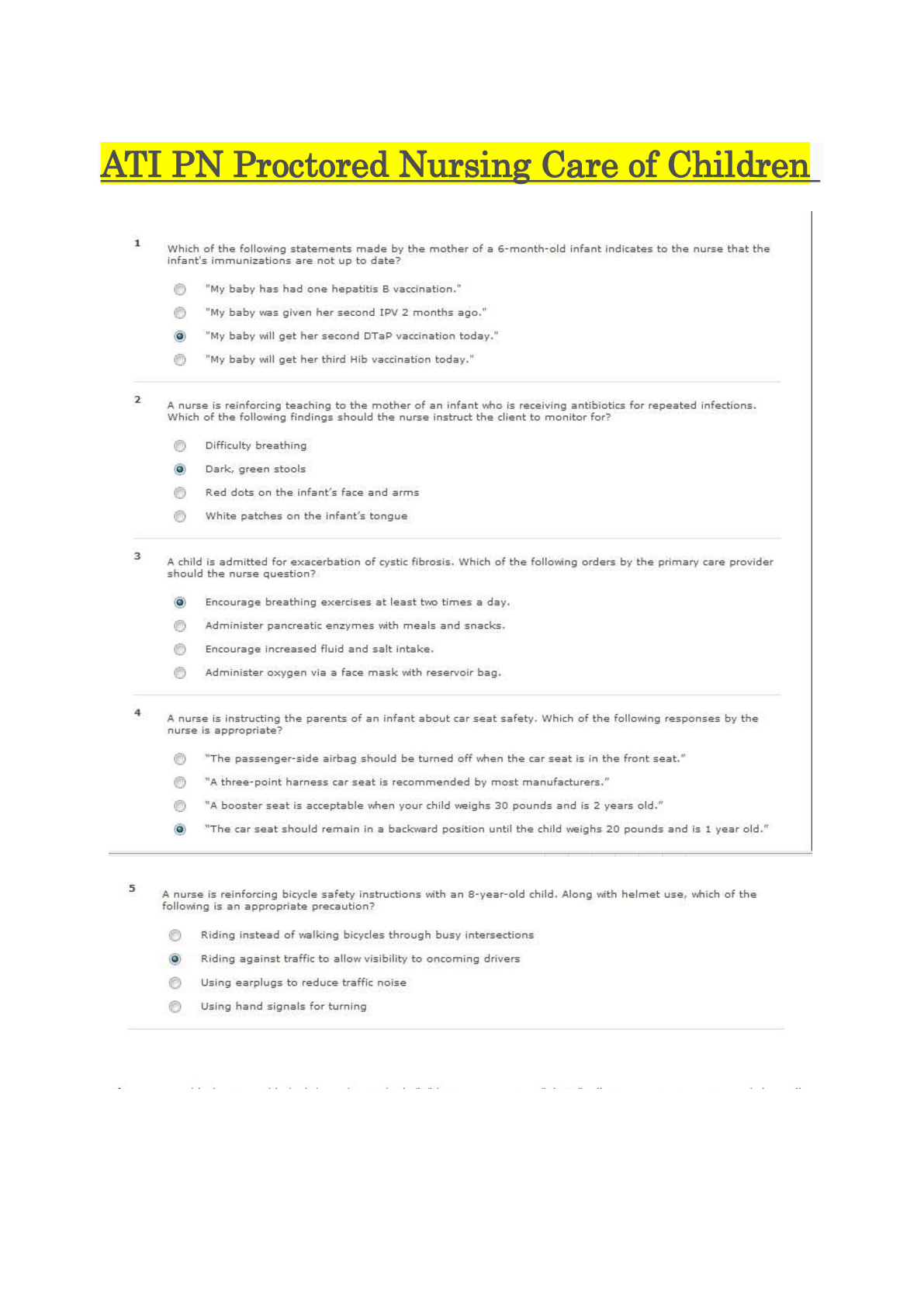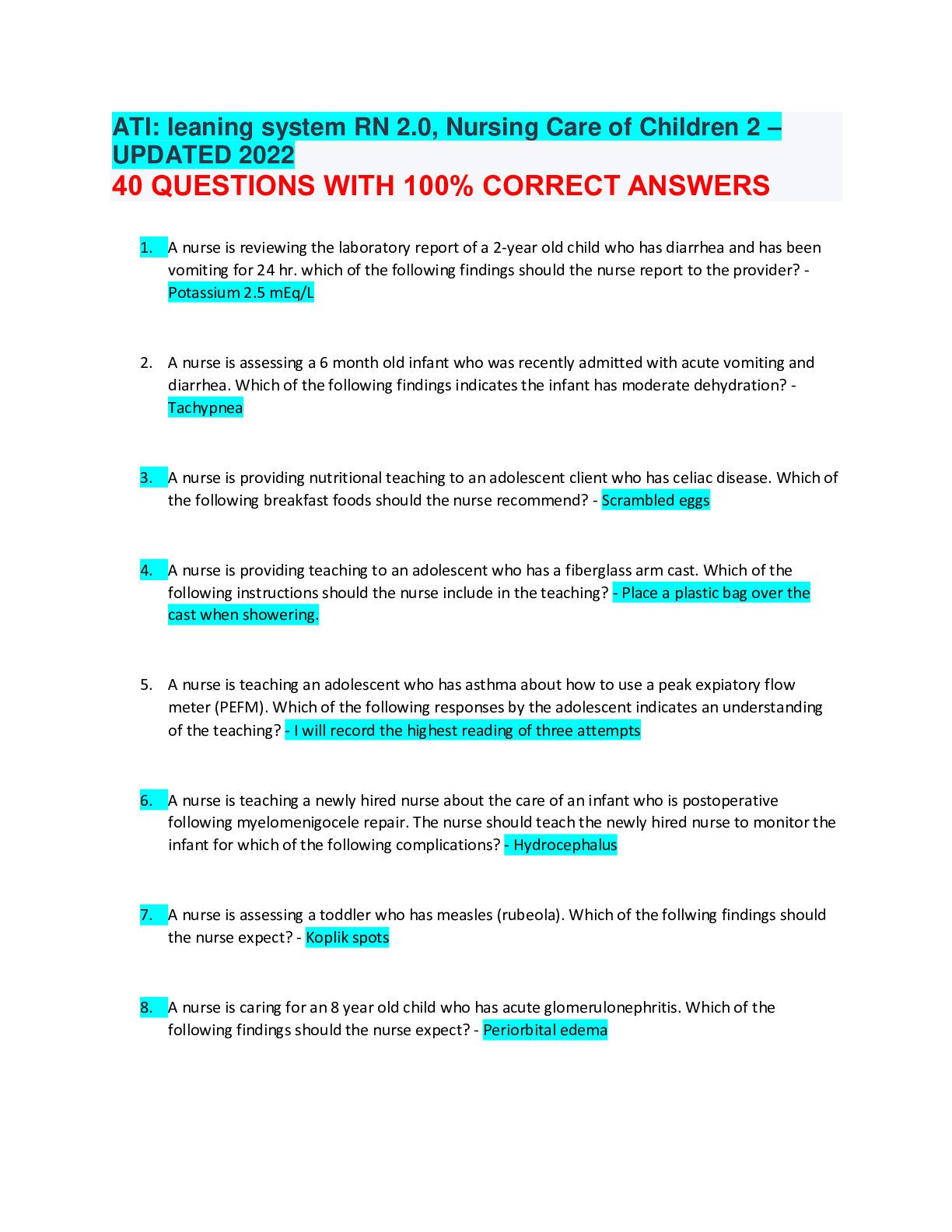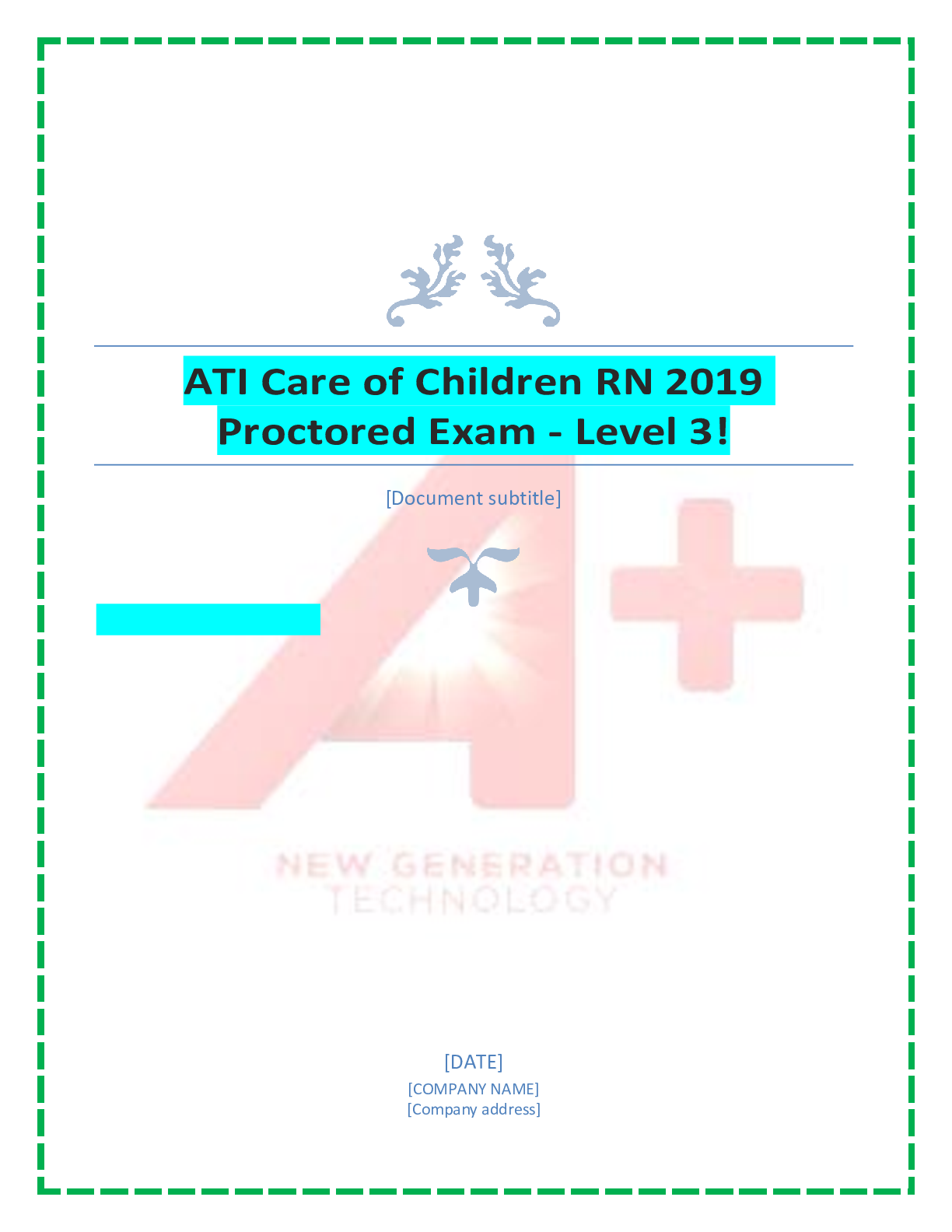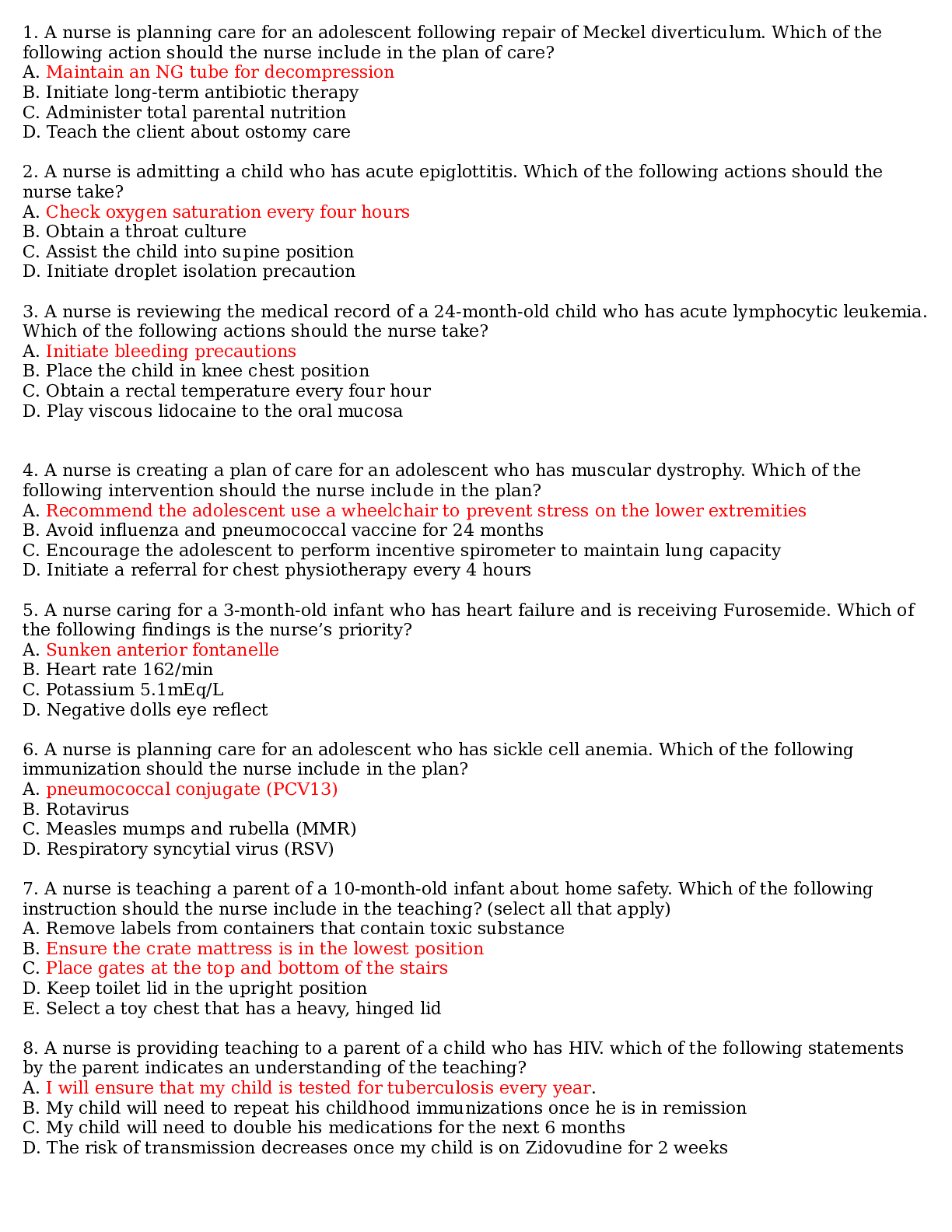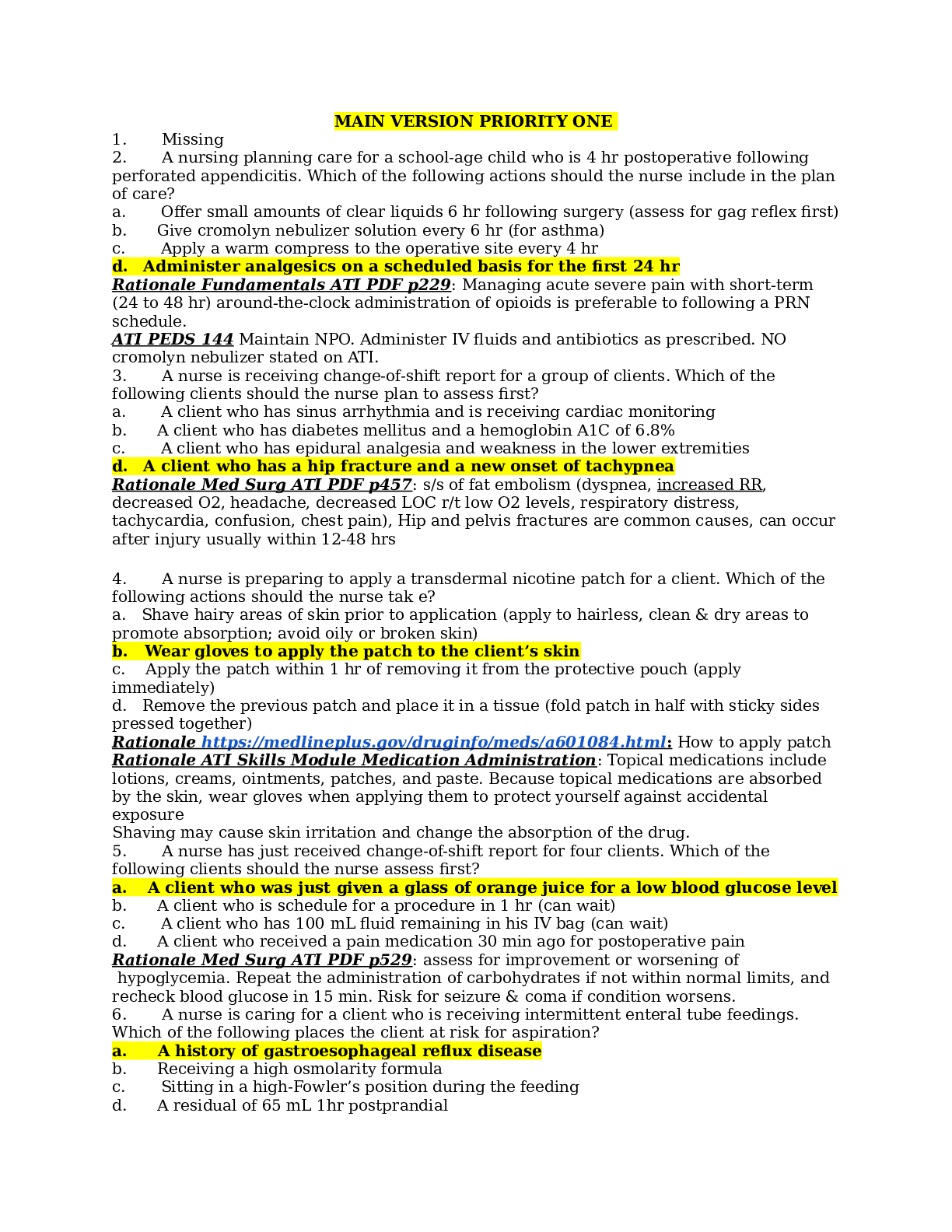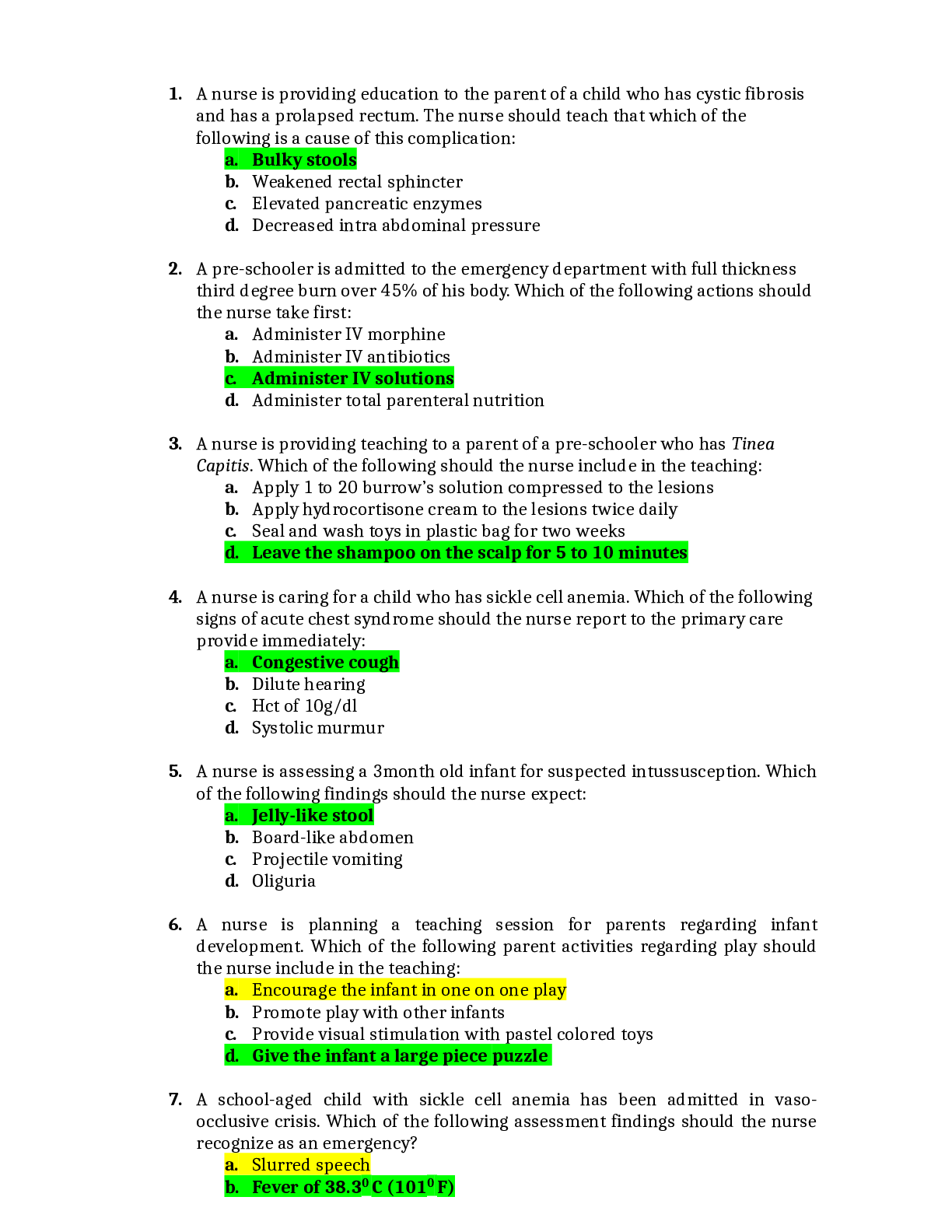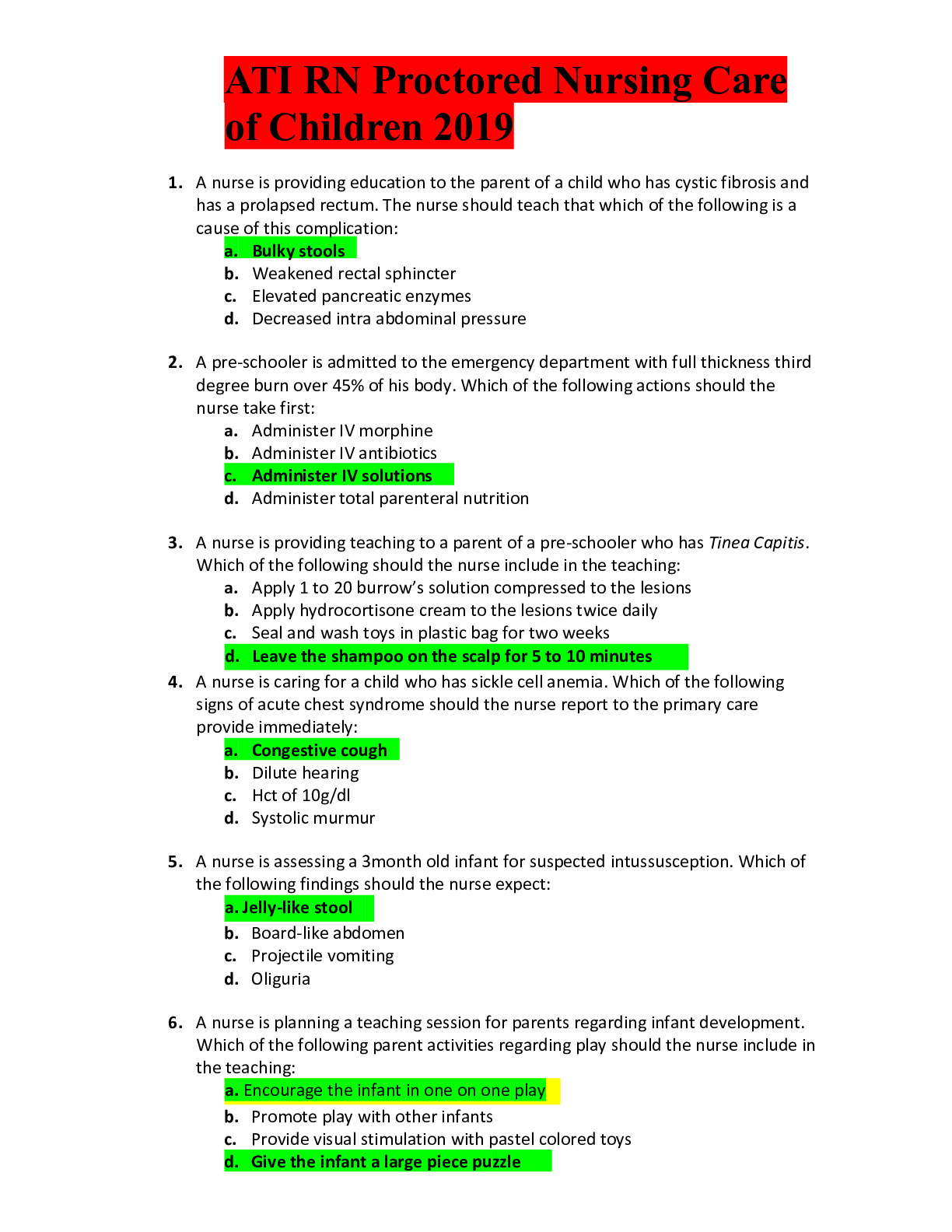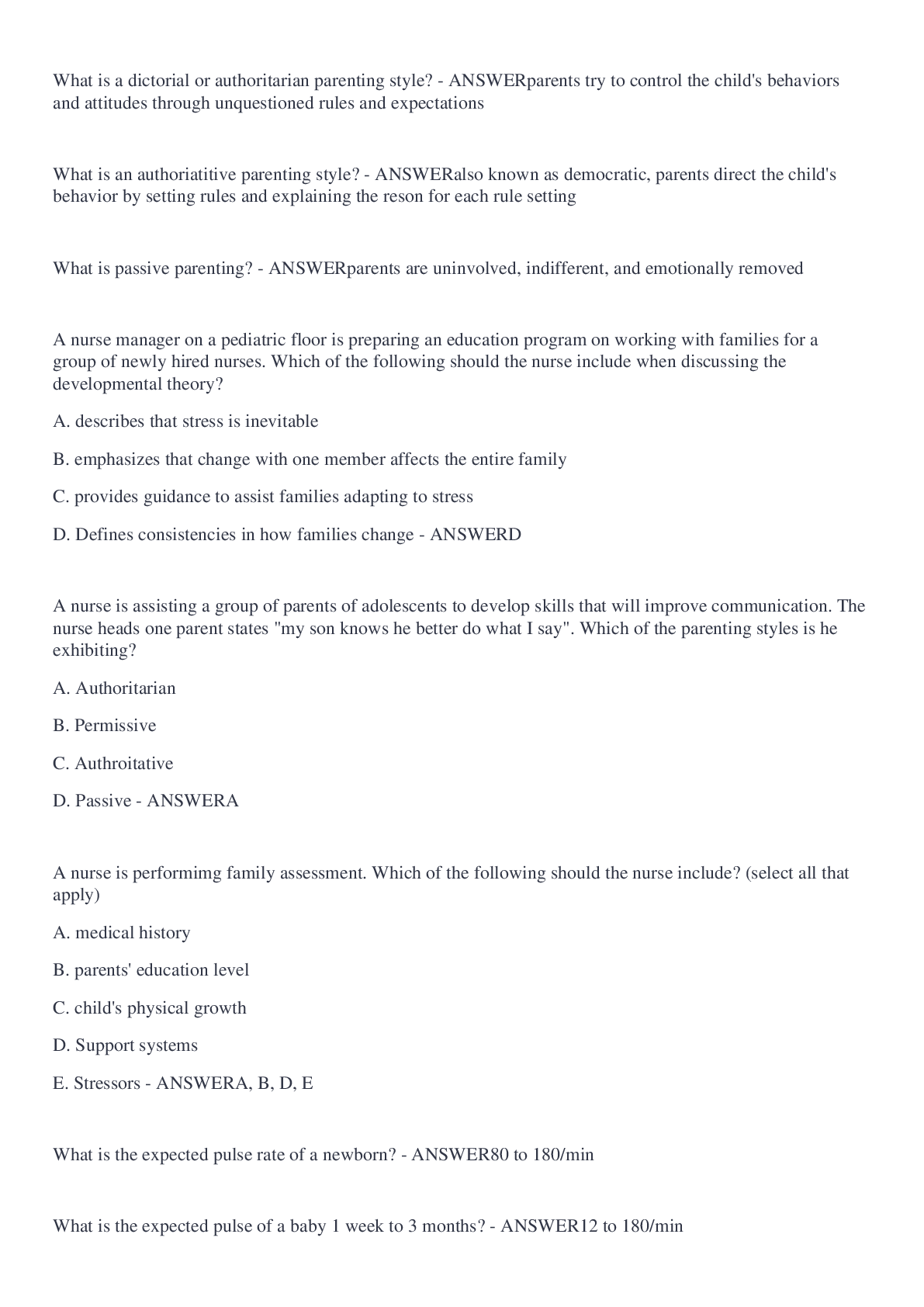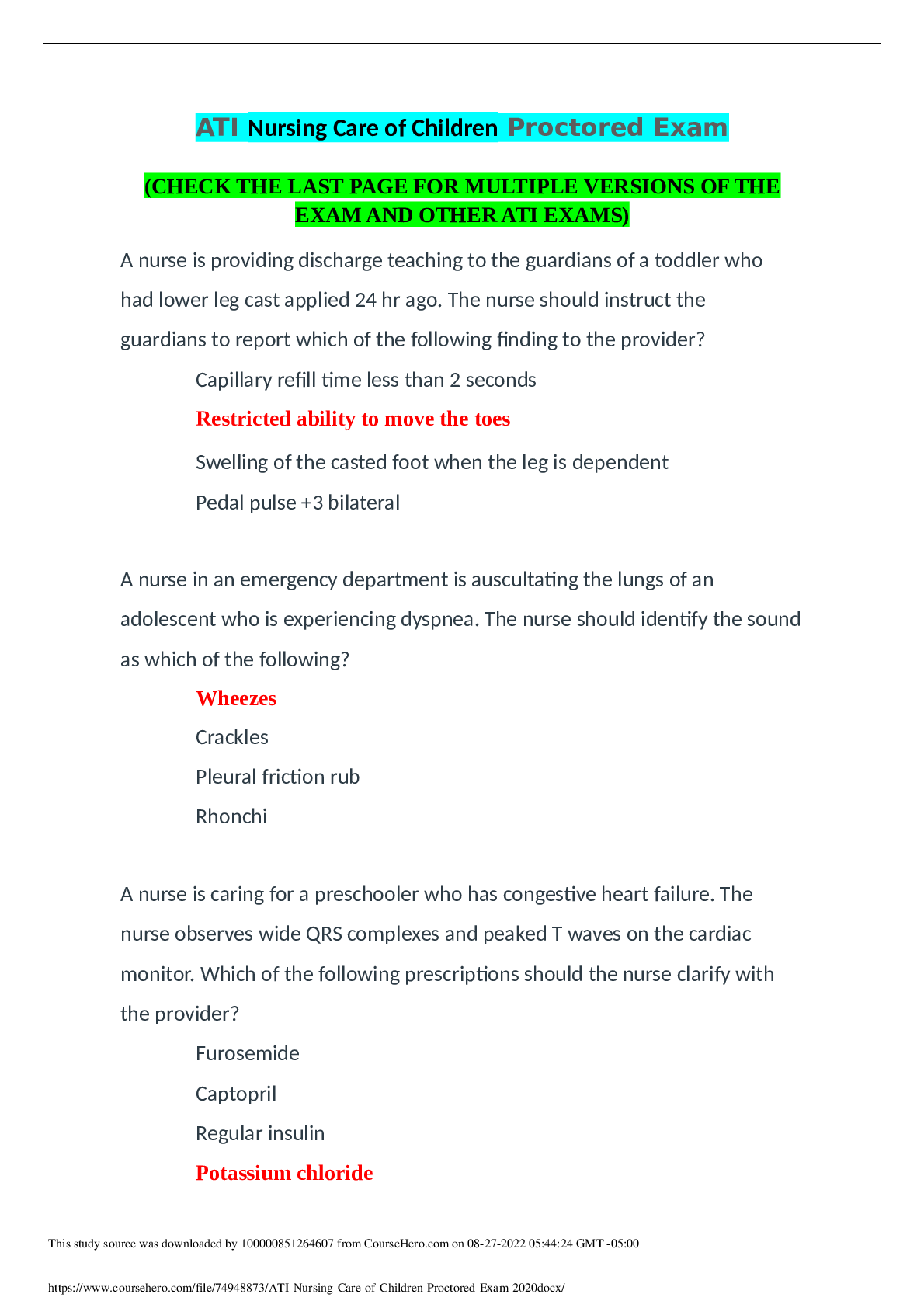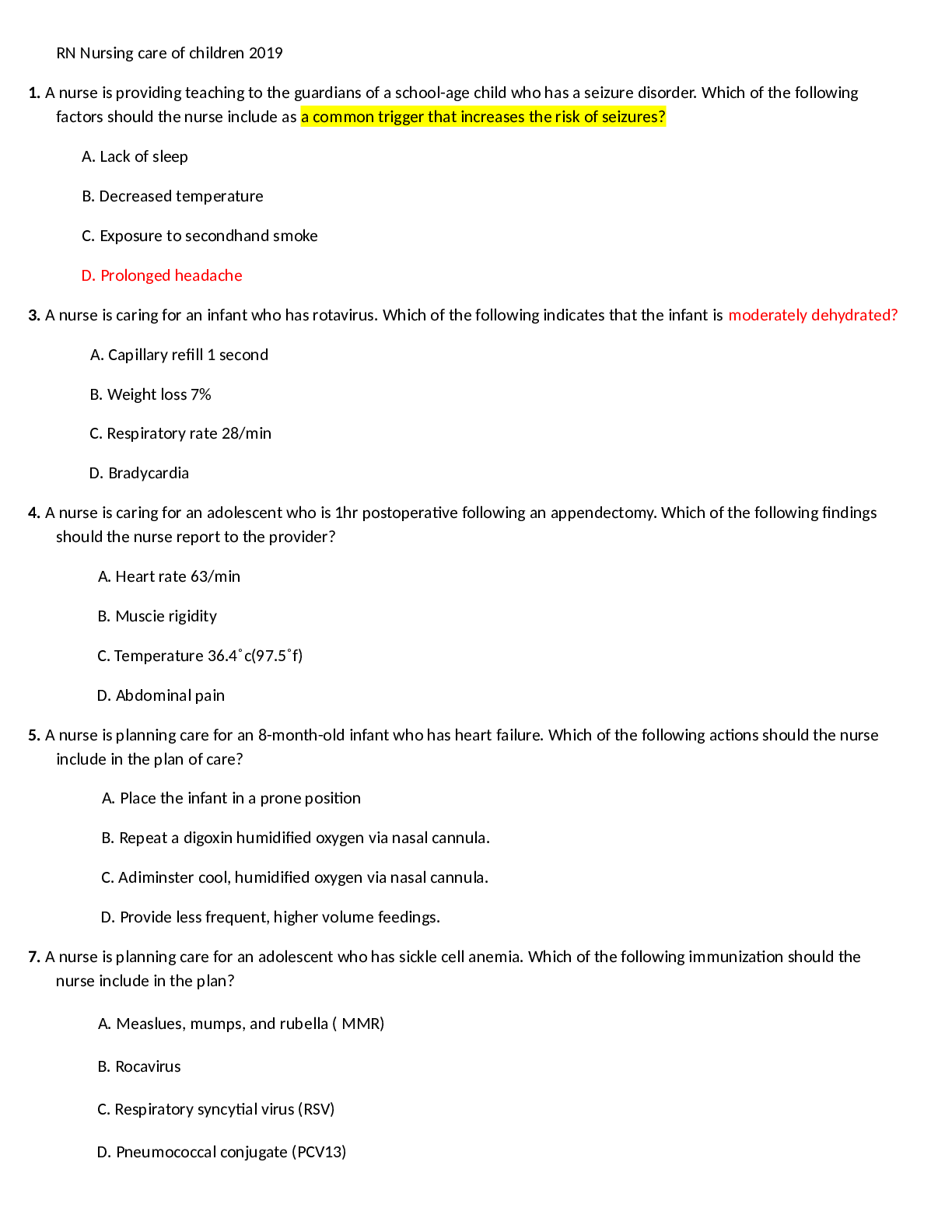NR 328 ATI Nursing Care of Children 2
Document Content and Description Below
PEDS: Nursing Care of Children 2 1. A nurse in an emergency department is caring for a 4-year-old child who has burns to the neck and face following a house fire. Which of the following action... s should the nurse take first? A. Cover the child's wounds with a clean, dry cloth. B. Establish IV access for the child with a large-bore catheter. C. Provide reassurance to the child's parents. D. Determine the child's breathing pattern. 2. A nurse is providing teaching to the parent of a 2-year-old toddler about nutrition. Which of the following statements by the parent indicates an understanding of the teaching? A. "My child should consume 1,000 calories per day." B. "My child should have 4 ounces of protein per day." C. "I should give my child 32 ounces (4 cups) of milk per day." D. "I should feed my child 4 ounces (1/2 cup) of vegetables per day." 3. A nurse is providing discharge teaching to the parent of a school-age child who has leukemia and is receiving chemotherapy. Which of the following statements by the parent indicates an understanding of the teaching? A. "I will take my child's rectal temperature daily." B. "I will make sure my child gets his MMR vaccine this week." C. "I will inspect my child's mouth every day for sores." D. "I will allow my child to ride his bicycle tomorrow." 4. A nurse is preparing to obtain an antistreptolysin O (ASO) titer from a child who has acute glomerulonephritis. The child's parent asks the nurse to explain the purpose of the test. Which of the following responses should the nurse make? A. "The test determines the level of antibiotics in your child's blood." B. "The test tells us if your child ever had the measles." C. "The test verifies the amount of albumin in your child's blood." D. "The test shows us if your child had a recent strep infection." 5. A nurse is providing nutritional teaching to an adolescent client who has celiac disease. Which of the following breakfast foods should the nurse recommend? A. Plain flour pastry B. Wheat cereal C. Scrambled eggs D. Rye toast 6. A nurse is providing teaching to an adolescent who has scoliosis and a new prescription for a Boston brace. Which of the following responses by the adolescent indicates an understanding of the teaching? A. "I can take my brace off to sleep every night at bedtime." B. "I can take my brace off for about an hour daily to shower." C. "I should loosen the straps on my brace if it is rubbing my skin." D. "I should place the pads of brace against my skin with a t-shirt over them." 7. A nurse is assessing a toddler who has measles (rubeola). Which of the following findings should the nurse expect? A. Koplik spots B. Parotitis C. Strawberry tongue D. Paroxysmal cough 8. A nurse is providing dietary teaching to the parent of a child who has cystic fibrosis. Which of the following dietary recommendations should the nurse make? A. Increase the child's protein intake. B. Decrease the child's calorie intake. C. Increase the child's fiber intake. D. Decrease the child's salt intake. 9. A nurse is admitting a child who has Wilms' tumor. Which of the following actions should the nurse take? A. Initiate contact precautions for the child. B. Explain to the parents that chemotherapy will start 3 months following surgery. C. Put a "no abdominal palpation" sign over the child's bed. D. Prepare the child for a spinal tap. 10. A nurse is caring for an infant following surgical repair of a cleft lip and palate. Which of the following actions should the nurse take? A. Keep the infant's mouth open by using a tongue blade for 4 hr following surgery. B. Suction the infant gently with a bulb syringe PRN. C. Place the infant in prone position. D. Clean the infant's incision with chlorhexidine. 11. A clinic nurse is providing teaching to the parent of a 1-month-old infant who has gastroesophageal reflux. Which of the following statements by the parent indicates an understanding of the teaching? A. "I will give the lansoprazole 30 min after my baby's feedings." B. "I will lay my baby on her side after feedings." C. "I will give my baby a bottle just before bedtime." D. "I will add rice cereal to my baby's feedings." 12. A nurse is teaching about clinical manifestations of tracheomalacia to a parent of an infant who had tracheoesophageal fistula repair as a newborn. Which of the following findings should the nurse include in the teaching? A. Absence of bowel sounds B. Neck contortions C. Barking cough D. Projectile vomiting 13. A nurse in an emergency department is assessing a school-age child who is experiencing an acute asthma exacerbation. Which of the following findings is the priority for the nurse to report to the provider? A. Excessively prolonged expiration B. Increased diaphoresis C. Increased production of frothy sputum D. Sudden decrease in wheezing 14. A nurse is caring for a 12-month-old infant following surgical repair of a cleft palate. The nurse should plan to feed the infant using which of the following instruments? A. Spoon B. Straw C. Firm nipple D. Cup 15. A nurse in an emergency department is caring for a toddler who is in acute respiratory distress. Which of the following findings should alert the nurse to the possibility of epiglottitis? A. Lethargy B. Spontaneous coughing C. Drooling D. Hoarseness 16. A nurse is reviewing the laboratory report of a toddler who is receiving chemotherapy for leukemia. Which of the following laboratory values should the nurse report to the provider? A. Platelets 150,000/mm3 B. Hgb 6 g/dL C. WBC 6,000/mm3 D. Potassium 4.5 mEq/L 17. A nurse is assessing pain in a 3-year-old child following a tonsillectomy. Which of the following rating scales should the nurse use to determine the child's pain level? A. Word-Graphic Rating Scale B. Color Tool C. Poker Chip Tool D. FACES Rating Scale 18. A nurse is teaching a newly hired nurse about the care of an infant who is postoperative following myelomeningocele repair. The nurse should teach the newly hired nurse to monitor the infant for which of the following complications? A. Hydrocephalus B. Congenital hypotonia C. Otitis media D. Osteomyelitis 19. A nurse is caring for a 6-week-old infant following a pyloromyotomy. Which of the following forms of feeding should the nurse anticipate for the infant 6 hr after the procedure? A. Bottle formula with added protein B. Small, frequent bottle feedings of electrolyte solution C. Continuous nasoduodenal tube feedings D. Bolus feedings via gastrostomy tube 20. A nurse is caring for a child who is postoperative following a tonsillectomy. Which of the following findings is the nurse's priority? A. Nausea B. Hoarse voice C. Frequent swallowing D. Sore throat 21. A nurse is providing teaching to an adolescent who has a fiberglass arm cast. Which of the following instructions should the nurse include in the teaching? A. Place a plastic bag over the cast when showering. B. Insert a dull knitting needle into the cast to rub itchy skin. C. Exercise fingers every 8 hr for the first 24 hr. D. Draw on the cast using magic markers. 22. A nurse is teaching the parent of a preschool-age child about the treatment for pinworms. Which of the following statements by the parent indicates an understanding of the teaching? A. "I will give my child a dose of albendazole today and again in 2 weeks." B. "I will collect specimens immediately after my child has a bowel movement." C. "I will give my child a tub bath twice each day." D. "I will place my child's bed linens in a sealed plastic bag for 7 days." 23. A nurse is assessing a 6-month-old infant who was recently admitted with acute vomiting and diarrhea. Which of the following findings indicates the infant has moderate dehydration? A. Bulging anterior fontanel B. Bradycardia C. Tachypnea D. Polyuria 24. A nurse is caring for a child who is in skeletal traction. Which of the following actions is the nurse's priority? A. Perform passive range of motion for unaffected joints. B. Massage the child's pressure areas. C. Increase the child's fluid intake. D. Encourage the child to use an incentive spirometer. 25. A nurse is reviewing the laboratory report of a 2-year-old child who has diarrhea and has been vomiting for 24 hr. Which of the following findings should the nurse report to the provider? A. Hct 40% B. Potassium 2.5 mEq/L C. Serum creatinine 0.4 mg/dL D. BUN 6 mg/dL 26. A nurse is assessing a child who has a ventricular septal defect. Which of the following findings should the nurse expect? A. Diastolic murmur B. Murmur at the left sternal border C. Cyanosis that increases with crying D. Widened pulse pressure 27. A home health nurse is developing a plan of care for the parents of a toddler who has hemophilia. Which of the following instructions should the nurse include in the plan? A. Administer low-dose aspirin for pain. B. Inspect the toddler's toys for sharp edges. C. Perform passive range-of-motion to the affected joint during a bleeding episode. D. Avoid contact with people who have respiratory infections. 28. A nurse is assessing a 6-month-old infant following a cardiac catheterization. Which of the following findings should the nurse report to the provider? A. Temperature of 37.5° C (99.5° F) B. Apical pulse rate 140/min C. BP 86/40 mm Hg D. Respiratory rate of 32/min 29. A nurse is providing discharge teaching to the parents of a child who has nephrotic syndrome. Which of the following instructions should the nurse include in the teaching? A. Restrict the child's potassium intake. B. Administer acetaminophen to the child twice daily. C. Weigh the child once each week. D. Keep the child away from people who have an infection. 30. A nurse is teaching an adolescent who has asthma about how to use a peak expiratory flow meter (PEFM). Which of the following responses by the adolescent indicates an understanding of the teaching? A. "I will breathe in through the mouthpiece, hold my breath for 5 seconds, and then exhale." B. "If I get a reading in the green zone, I will tell my parents immediately so they can call the doctor." C. "I will slowly exhale through the mouthpiece over a 10 second interval." D. "I will record the highest reading of three attempts." 31. A nurse is creating a plan of care for a child who has leukopenia secondary to chemotherapy. Which of the following interventions should the nurse include in the plan? A. Maintain the child on bed rest. B. Monitor the child for increased temperature. C. Administer oxygen to the child. D. Monitor the child for bleeding. 32. A nurse is caring for an 8-year-old child who has acute glomerulonephritis. Which of the following findings should the nurse expect? A. Hypotension B. Stomatitis C. Bloody diarrhea D. Periorbital edema 33. A nurse is providing teaching to the parents of a school-age child who has type 1 diabetes mellitus about management of hypoglycemia. Which of the following responses by the parents indicates an understanding of the teaching? A. "I will make sure my child drinks 240 mL (8 oz) of milk as soon as possible." B. "I will give my child 2 units of regular insulin." C. "I will insist that my child lies down to rest for 30 minutes." D. "I will check my child's urine for glucose twice daily." \34. A nurse is providing teaching about immunizations to the parents of a severely immunocompromised child who has human immunodeficiency virus (HIV). Which of the following statements should the nurse include in the teaching? A. "Your child's immunizations today will be half-doses." B. "The pneumococcal and influenza vaccines are recommended for your child." C. "Immunizations will be delayed until your child tests HIV negative." D. "Your child will need to start the immunization schedule over once his laboratory values are within reference range." 35. A nurse is reviewing the laboratory results of a child who has experienced diarrhea for the past 24 hr. Which of the following values for urine specific gravity should the nurse expect? A. 1.010 B. 1.035 C. 1.020 D. 1.005 36. A nurse is providing teaching to the parents of an infant who has acute otitis media about how to administer antibiotic eardrops. Which of the following instructions should the nurse include? A. Chill the medication prior to administration. B. Massage the anterior area of the infant's ear following administration. C. Hyperextend the infant's neck during administration. D. Pull the auricle up and back during medication administration. 37. A nurse is assessing a 2-month-old infant who has a ventricular septal defect. Which of the following findings should the nurse report to the provider? A. Weight gain of 1.8 kg (4 lb) B. Heart rate 125/min C. Soft, flat fontanel D. Systemic murmur 38. A nurse is caring for a child who has a possible intussusception. The parents of the child ask the nurse how the diagnosis is made. Which of the following responses should the nurse make? A. "An abdominal ultrasound will confirm the pocket in the intestine." B. "Genotyping will be done to identify this condition." C. "A biopsy will be done on a small amount of tissue from the colon." D. "An upper GI series should identify the area involved." 39. A nurse is planning care for an adolescent who has sickle cell anemia and is experiencing a vaso-occlusive crisis. Which of the following interventions should the nurse include in the plan? A. Apply cold compresses to the child's extremities. B. Administer meperidine every 4 hr until the crisis has resolved. C. Maintain the child on bed rest. D. Decrease the child's fluid intake for 8 hr. 40. A nurse is teaching a school-age child and his parents how to self-administer insulin. Which of the following actions should the nurse take first? A. Allow a parent to administer an injection to the nurse. B. Have the child teach the injection technique to the parents. C. Have a parent administer the insulin injection to the child. D. Demonstrate the injection technique on an orange. [Show More]
Last updated: 11 months ago
Preview 1 out of 11 pages
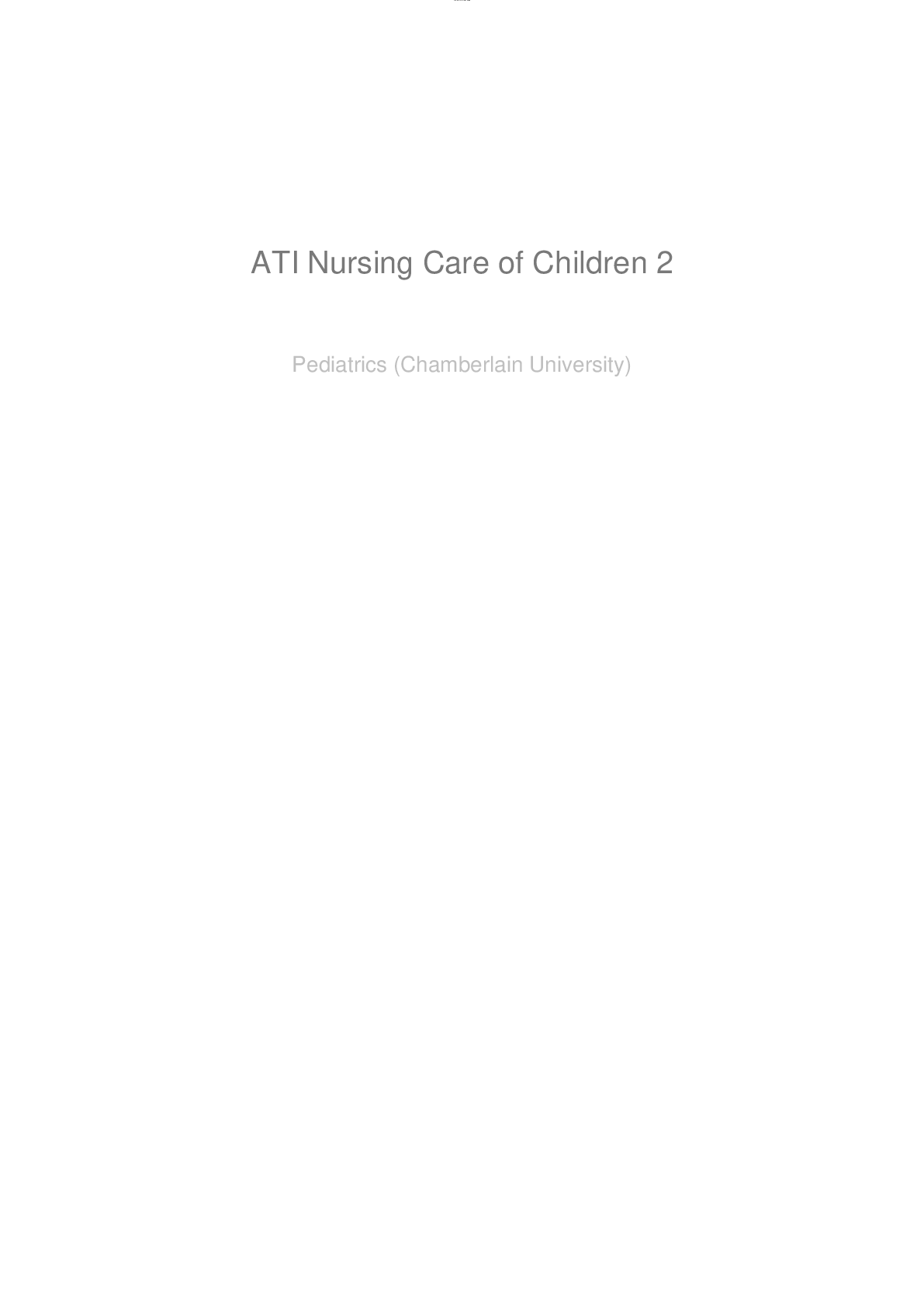
Reviews( 0 )
Document information
Connected school, study & course
About the document
Uploaded On
Mar 15, 2022
Number of pages
11
Written in
Additional information
This document has been written for:
Uploaded
Mar 15, 2022
Downloads
0
Views
32

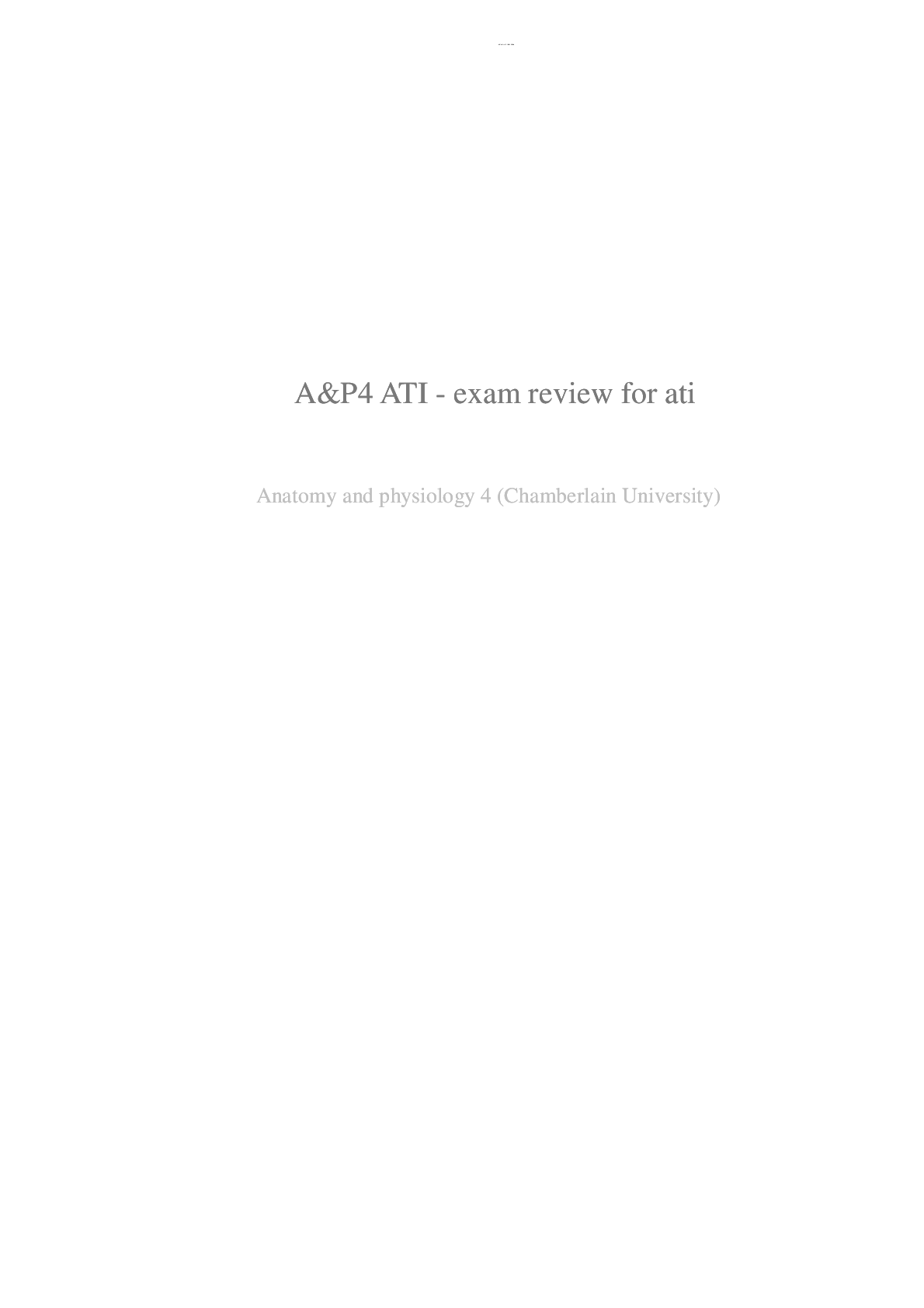
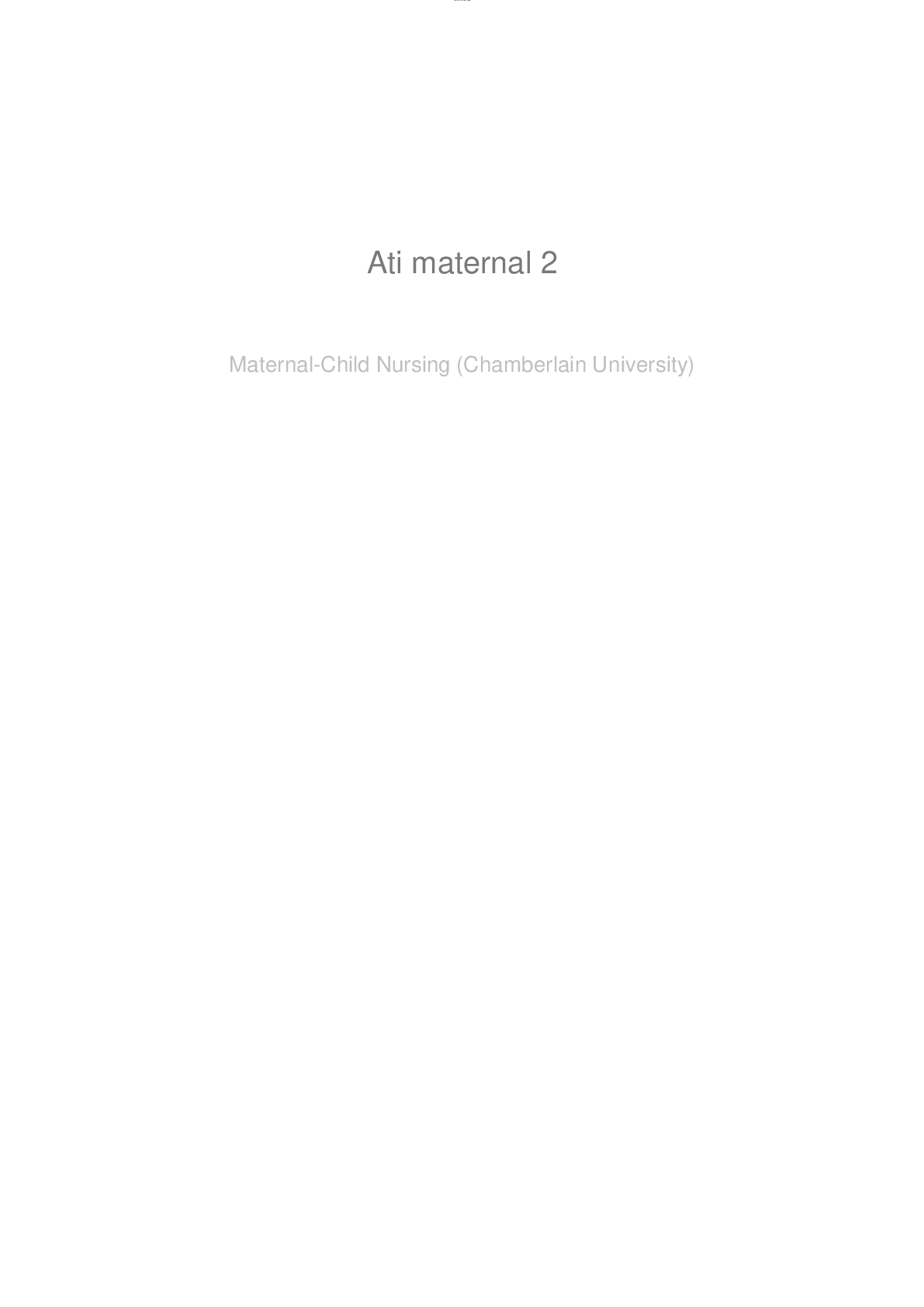
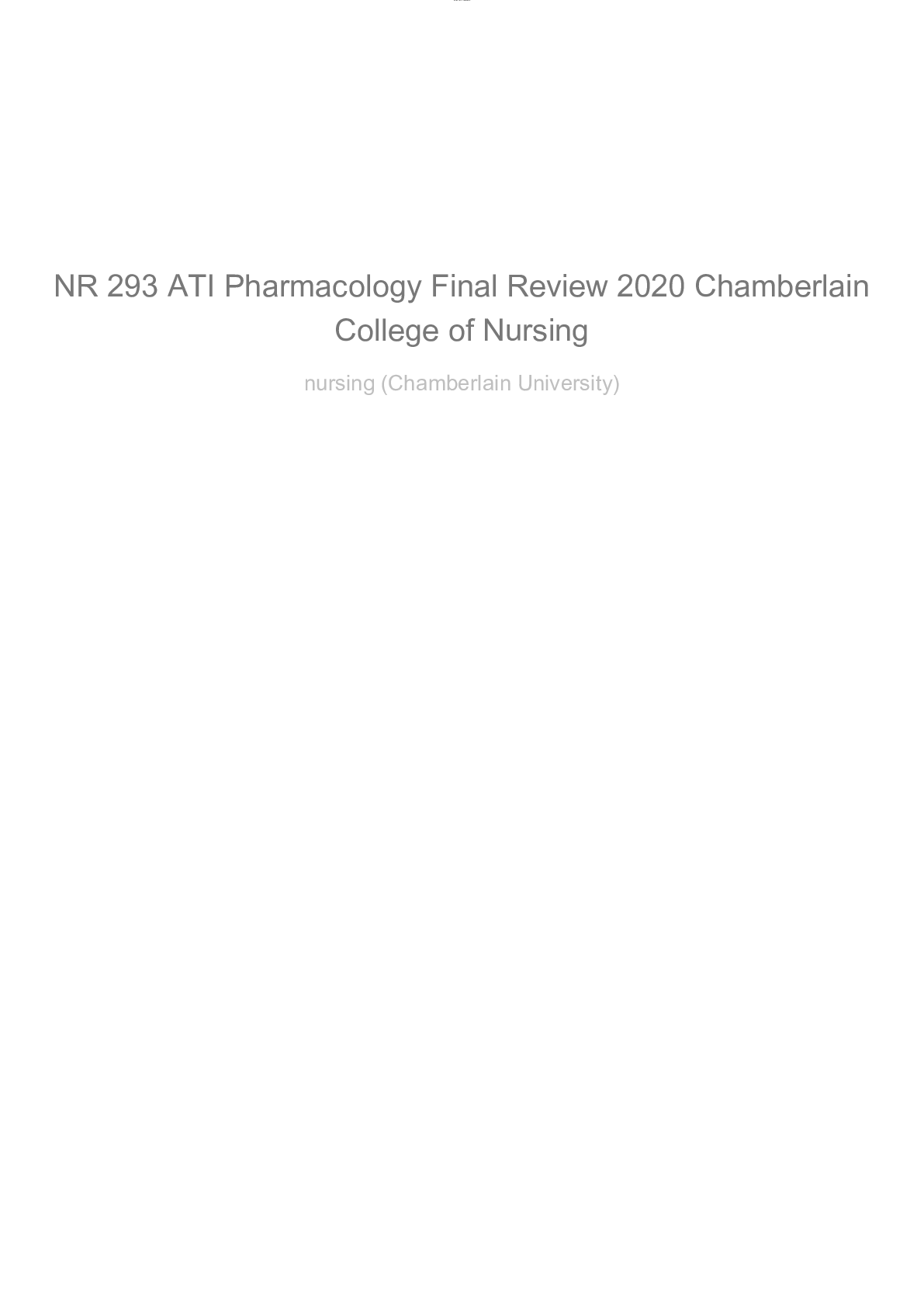
.png)
